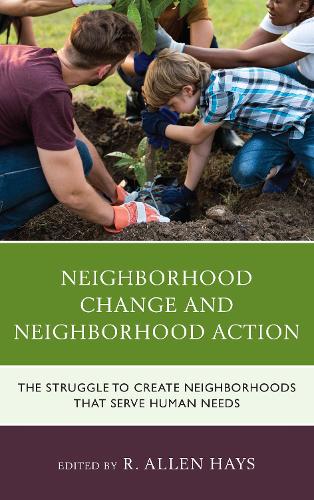
Neighborhood Change and Neighborhood Action: The Struggle to Create Neighborhoods that Serve Human Needs
(Hardback)
Available Formats
Publishing Details
Neighborhood Change and Neighborhood Action: The Struggle to Create Neighborhoods that Serve Human Needs
By (Author) R. Allen Hays
Contributions by Eileen Ahlin
Contributions by Maria Joo Lobo Antunes
Contributions by Daniel Brisson
Contributions by Claire Cahen
Contributions by Sara M. Eccleston
Contributions by Jyoti Gupta
Contributions by R. Allen Hays
Contributions by Stephanie Lechuga-Pea
Contributions by Jos Melndez
Bloomsbury Publishing PLC
Lexington Books
19th January 2018
United States
Classifications
Professional and Scholarly
Non Fiction
Urban and municipal planning and policy
307.14
Physical Properties
Hardback
234
Width 159mm, Height 239mm, Spine 22mm
513g
Description
This book is an examination of neighborhood mobilization and engagement from the perspective of several disciplines: psychology, social work, political science, planning, and education. The essays included in the work examine both internal and external factors related to the ability of neighborhoods to meet the human needs of their residents. They address the constraints put on neighborhood mobilization by the local and international political economy, but they also show how those constraints can, in a number of cases, be overcome by effective action. They treat neighborhood engagement as an educational process through which residents enhance their skills and knowledge as they participate. Taken together, these essays provide a comprehensive and multi-faceted view of the issues facing contemporary urban neighborhoods.
Reviews
Neighborhood Change and Neighborhood Action is an excellent, multidisciplinary look at the most significant contemporary issues related to neighborhood-based political action and social organization. It offers readers a variety of methods, analytical approaches, and theoretical perspectives, all focused on the most important neighborhood issues shaping the urban agenda today. -- Edward G. Goetz, University of Minnesota
R. Allen Hays edited volumeoffers an incisive, multidisciplinary vision of neighborhoods as engines of inclusive governance and civic participation. The chapters are contributed by leading experts on the forces that have shaped and are continuing to restructure neighborhoods in the United States and beyond. During an era of rising nationalism, nativism, social inequality, and the corporatization of our local and national politics, Hays book provides a compelling and timely counterpoint to these regressive trends that have gained traction in the early twenty-first centuryboth in the United States and throughout the world. Hays and his fellow authors show how neighborhoods can anchor future efforts to democratize our communities by actively engaging all residentsincluding presently marginalized members of low-income, racial minority, and immigrant groupsthrough inclusive governance and planning strategies. This book is an outstanding scholarly contribution to the interface of environment-behavior studies, urban planning, economics, sociology, and political science, with profound implications for community practice and public policy. -- Dan Stokols, University of California, Irvine
Collectively, the chapters included in this book constitute an important contribution to our understanding of how neighborhoods, and the social interactions that take place there, can act as platforms for collective social action and social change. This impressive and timely edited collection would make an excellent supplemental text for courses on community development and related topics. -- William M. Rohe, University of North Carolina at Chapel Hill
Author Bio
R. Allen Hays is emeritus professor of political science and public policy at the University of Northern Iowa.
